Aldactone 25
Aldactone 25 is a member of the ‘diuretic’ (water pill) class of medications, which are used primarily to remove excess water from the body and treat fluid overload (oedema). It also maintains stable potassium levels in the blood and prevents hypertension (high blood pressure caused by edema) (fluid retention). Edema or fluid accumulation is associated with pulmonary hypertension (high blood pressure in the lungs) and heart failure (irregular pumping of heart). The most common symptoms of oedema are shortness of breath, chest pain (angina), abnormal heart rhythms (arrhythmia), and swelling in the hands or abdomen.
Spironolactone, which is contained in Aldactone 50, is a short-acting diuretic used to treat pulmonary hypertension (high blood pressure in the lungs), heart failure, and hepatic cirrhosis-related resistant oedema (fluid overflow) (chronic liver damage). Aldactone 25 increases the amount of urine produced by the kidneys. It effectively treats edema (swelling) brought on by heart, liver, kidney, or lung illness by lowering the body’s excess fluid levels. This reduces the heart’s burden and enables it to circulate blood more effectively throughout the body. Consequently, it assists in the decrease of excessive blood pressure, hence reducing the risk of future heart attack, stroke, or angina (chest pain).
Aldactone 25 can be administered either with or without food. With a glass of water, it must be finished in its whole. It must not be eaten, fractured, or crushed. Your physician will determine the frequency of Aldactone 50 administration based on your medical condition. Hypotension, dehydration, dizziness, electrolyte abnormalities (potassium and sodium), elevated blood creatinine levels, headache, nausea, and male breast enlargement are all possible adverse effects. The majority of adverse effects of Aldactone 50 do not require medical treatment and resolve with time. However, if the bad effects persist, visit a physician.
Stopping Aldactone 25 on your own can increase your risk for heart disease and stroke by increasing your blood pressure. Inform your doctor if you have any type of kidney, liver, or heart condition. Please contact your doctor if you are pregnant or nursing so that the right dosage of Aldactone 25 can be administered. Please inform your doctor if you are allergic to Aldactone 25 or if you are taking any other medications. Reduce the quantity of table salt (sodium chloride) in your diet to alleviate swelling.
Aldactone 25 is used to treat high blood pressure (hypertension) and edema (fluid overload)
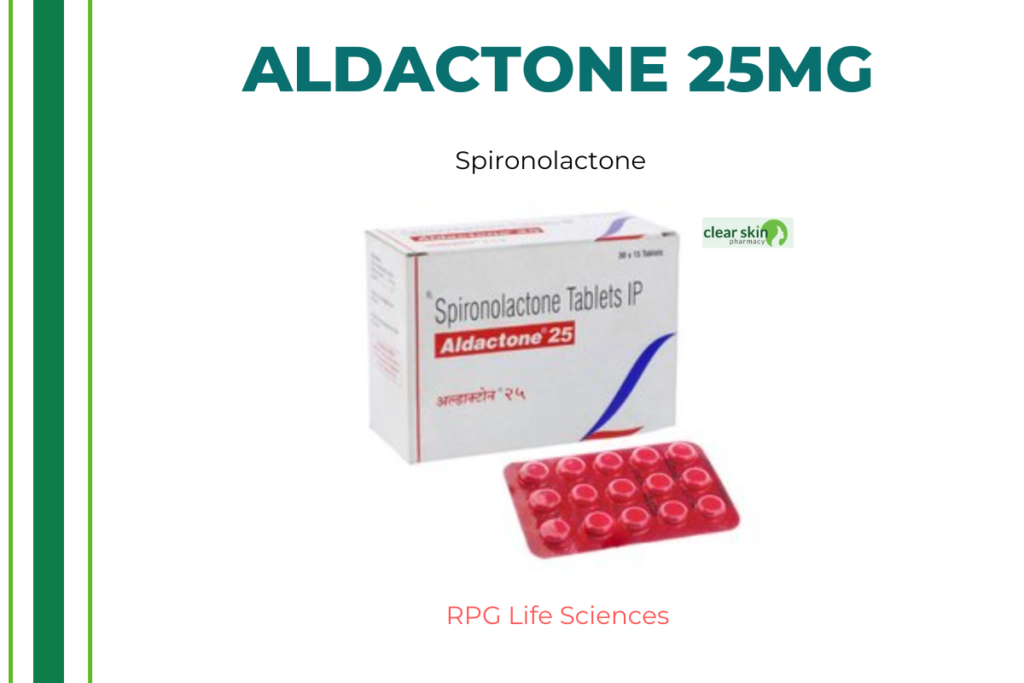
Medicinal Advantages
Aldactone 25 includes ‘Spironolactone,’ a short-acting diuretic (water pill) used to treat refractory edema caused by pulmonary hypertension (high blood pressure in the lungs), heart failure, and liver cirrhosis (chronic liver damage). Aldactone 25 increases the amount of urine produced by the kidneys. It effectively treats edema (swelling) caused by heart, liver, kidney, or lung conditions by lowering the body’s excess fluid levels. This reduces the heart’s burden and enables it to circulate blood more effectively throughout the body. Consequently, it assists in the decrease of excessive blood pressure, hence reducing the risk of future heart attack, stroke, or angina (chest pain).
Use Instructions
Aldactone 25 is available in both oral and suspension formulations. Aldactone 25 is an oral capsule/tablet that can be taken with or without food, or as directed by a physician. Aldactone 25 is not to be crushed or eaten. Aldactone 25 is available as a suspension and should be administered per your physician’s instructions. To avoid waking up to urinate, do not take this medication within four hours of bedtime. Your medical condition, age, and treatment response decide your dosage.
Storage
Store in a cool, dry location away from direct sunlight.
Aldactone 25 Tablet 15’s Side Effects
Aldactone 50, like other medications, has certain undesirable side effects, although they are not necessary. Hypotension, dehydration, dizziness, electrolyte abnormalities (potassium and sodium), elevated blood creatinine levels, headache, nausea, and male breast enlargement are all possible adverse effects. The majority of adverse effects of Aldactone 50 do not require medical treatment and resolve with time. However, if the bad effects persist, visit a physician.
Drug Recommendations
Spironolactone should not be administered to individuals who are allergic to it, have low blood pressure (less than 90 mm Hg), have experienced a heart attack, have kidney disease (creatinine clearance less than 30 mL/min), have liver disease, or are pregnant or planning to become pregnant. Contraindications include hypotension (hypertension), cardiogenic shock (sudden stoppage of blood flow to the heart), anuria (inability to pee), diabetes, and aortic stenosis (heart valve problem). Spironolactone can enter breast milk; however, its effects on the infant are unclear. If you are nursing and using Spironolactone, you should inform your doctor. Spironolactone can expand the breasts of both men and women. Stop using Spironolactone if you have breast enlargement; discontinuing Spironolactone may help alleviate this symptom. Spironolactone should not be taken in conjunction with potassium supplements or potassium-rich meals (bananas, broccoli), since this may lead to an excessive increase in blood potassium levels (hyperkalemia).
Interactions Between Drugs
Spironolactone may interact with other blood pressure medications (metoprolol, ramipril, hydrochlorothiazide, atorvastatin), lowering blood pressure and increasing the risk of serious complications. Among others, it interacts with anti-epileptic medications (carbamazepine, phenobarbital), anti-depressants (alprazolam), immune-suppressing drugs (cyclosporine), and painkillers (ibuprofen, aspirin).
Alcohol use is discouraged when taking Spironolactone to reduce the likelihood of undesirable side effects.
Cardiogenic shock (when the heart fails to pump enough blood to the body), stenosis of the heart valves, low blood pressure (hypotension), coronary heart disease, liver disease, or heart failure, low serum potassium (hypokalemia), and individuals with minimal urine output should not get spironolactone (anuria).
Cautionary Note
ALCOHOL
Alcohol should be avoided while taking Spironolactone to reduce the risk of unwanted side effects.
PREGNANCY
Spironolactone is a pregnancy category C drug that is contraindicated during pregnancy.
BREAST FEEDING
Avoid breastfeeding if you are on Spironolactone.
DRIVING
Spironolactone should not be used while driving due to its potential to induce sleepiness due to orthostatic hypotension (sudden drop in blood pressure on standing from lying position).
LIVER
Use Spironolactone with caution, especially if you have a history of liver problems. Depending on the condition of your liver, your doctor may alter your dosage.
KIDNEY
Spironolactone should be administered with caution, especially in patients with a history of kidney disease. Depending on the condition of your liver, your doctor may alter your dosage.
No habit formation
Advice on Diet and Lifestyle
With a BMI between 19.5-24.9, it is possible to maintain a healthy weight.
Participate in at least 125 minutes of regular physical activity or exercise every week, or around 30 minutes on most days. This can help you reduce your high blood pressure by around 5 mm Hg.
It is recommended to consume a diet rich in whole grains, fruits, vegetables, and low-fat dairy products.
Optimal sodium chloride (table salt) consumption for most persons is 2300 mg per day or less than 1500 mg per day.
Limit your alcohol consumption to one serving for women and two serves for men.
Stopping smoking is the greatest method to minimize your risk of heart disease.
Chronic stress can elevate blood pressure, therefore you should prevent it. Spending time with and appreciating your loved ones is a stress-reduction and mindfulness approach.
Monitor your blood pressure daily, and if it swings excessively, call your physician immediately.
Include omega 3 fatty acid-rich foods and beverages in your diet on a regular basis. You can also use low-fat cooking oils such as olive oil, soybean oil, canola oil, and coconut oil to lower your blood pressure.
Recommendations
Frequent monitoring of serum potassium, sodium, and creatinine levels is required during therapy with spironolactone. In addition, you should have your kidney function evaluated regularly.
Additional Information : This item is non-refundable.
Glossary of Diseases and Conditions
The accumulation of fluid in areas of the body such as the ankles, feet, and legs is known as edema. This condition typically causes swelling in these areas.
Hypertension is a chronic illness characterized by unusually high blood pressure. This disease can lead to the development of calcified arteries (blood vessels), which restricts blood and oxygen flow to the heart. Blood pressure measures the power with which our heart pumps blood to all parts of the body. Angina (chest discomfort) and heart attack can both be brought on by hypertension (when blood supply to the heart is blocked). High blood pressure may result in brain injury (stroke) and renal failure. One can identify elevated blood pressure with a blood pressure monitor or sphygmomanometer. Systolic pressure is the force exerted as the heart pumps blood out. In contrast, diastolic pressure occurs when the heart is at rest between heartbeats. If your blood pressure is 140/90 mm Hg, the systolic pressure is 140 mm Hg and the diastolic pressure is 90 mm Hg. The ideal blood pressure is 120/80 mm Hg.
FAQs
Spironolactone contains spironolactone, a short-acting diuretic used to treat fluid retention caused by pulmonary hypertension, heart failure, and cirrhosis of the liver (chronic liver damage). Spironolactone increases the volume of urine produced by the kidneys. It effectively treats edema (swelling) brought on by heart, liver, kidney, or lung illness by lowering the body’s excess fluid levels. This reduces the heart’s burden and enables it to circulate blood more effectively throughout the body. Consequently, it assists in the decrease of excessive blood pressure, hence reducing the risk of future heart attack, stroke, or angina (chest pain).
Spironolactone is capable of altering the menstrual cycle. It might cause menstruation to be unpleasant and irregular. Additionally, taking Spironolactone may induce breast discomfort and edema. If any of these symptoms continue and your discomfort worsens, see your physician for the most effective treatment choices.
Spironolactone is known to increase blood potassium levels. If you take potassium supplements or consume potassium-rich foods, such as bananas and broccoli, your potassium level may become excessively high, leading to hyperkalemia.
This condition describes individuals who are unable to urinate. Spironolactone might cause kidney damage, thus anyone with anuria should avoid using it.
Gynecomastia is a condition characterized by male breast enlargement. Spironolactone can expand the breasts of both men and women. Stop using Spironolactone if you have breast enlargement; discontinuing Spironolactone may help alleviate this symptom.

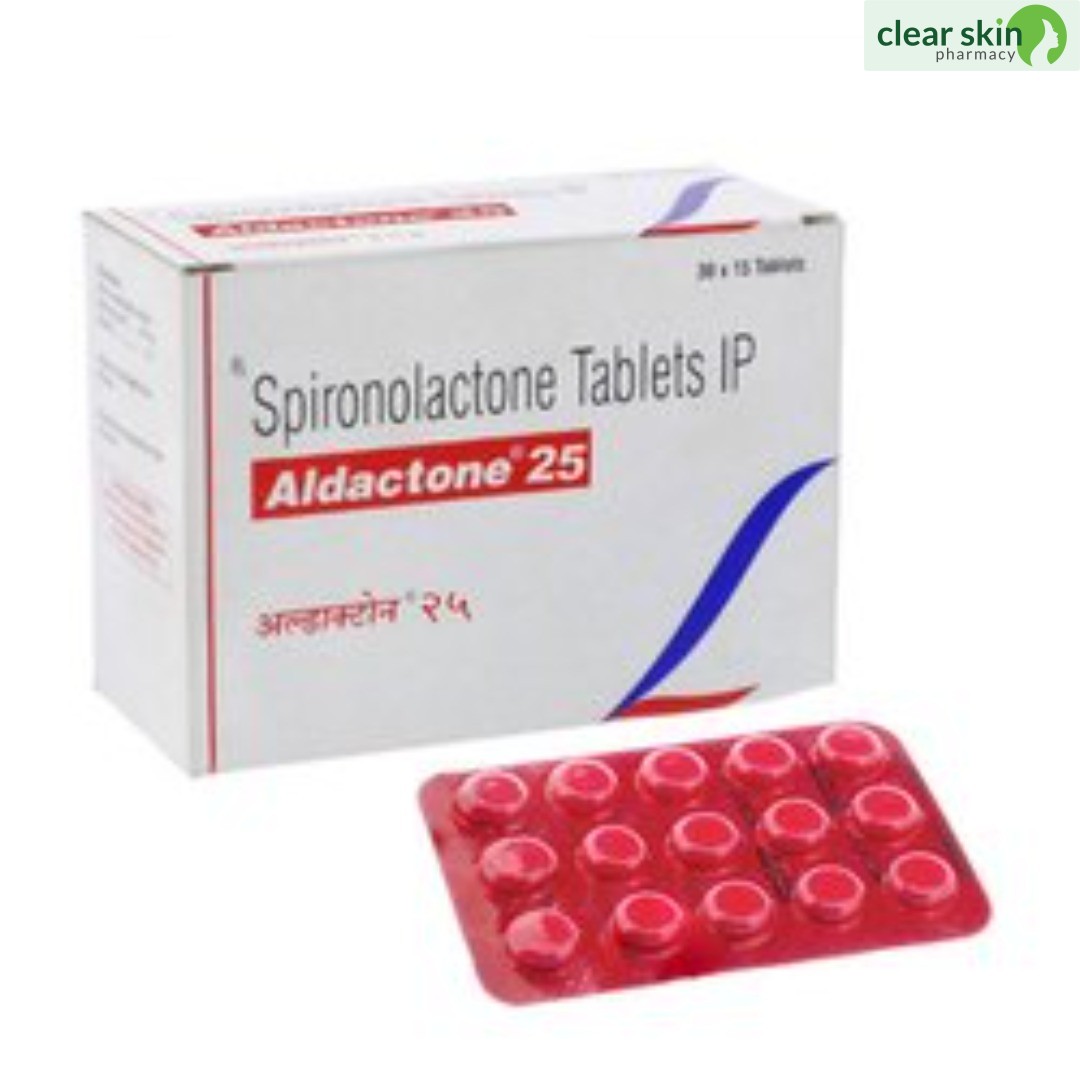

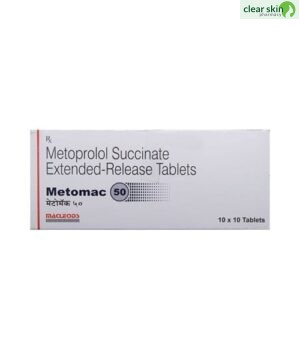

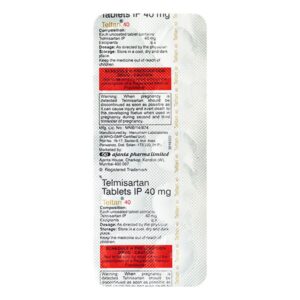
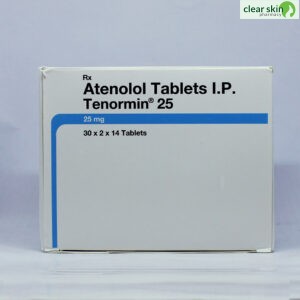

Be the first to review “ALDACTONE 25MG 15 Tablets”